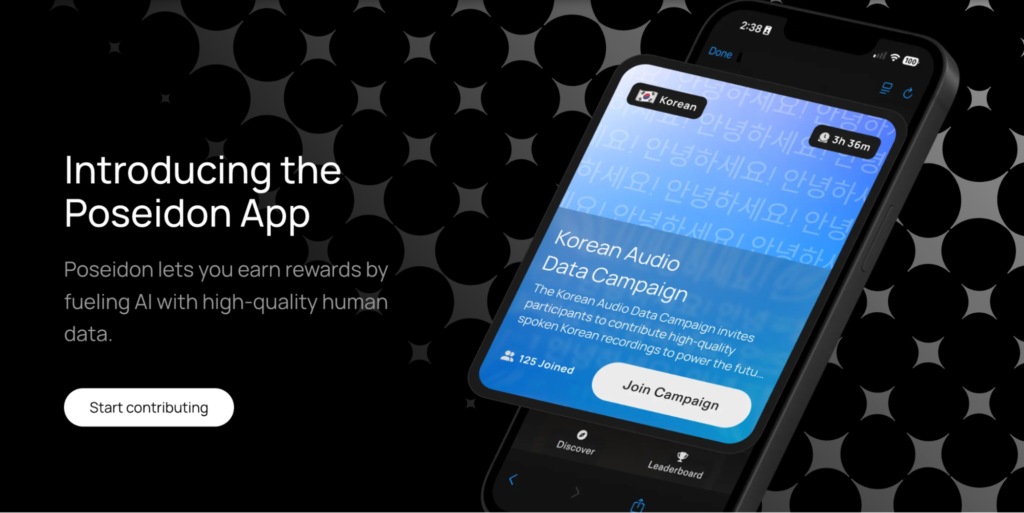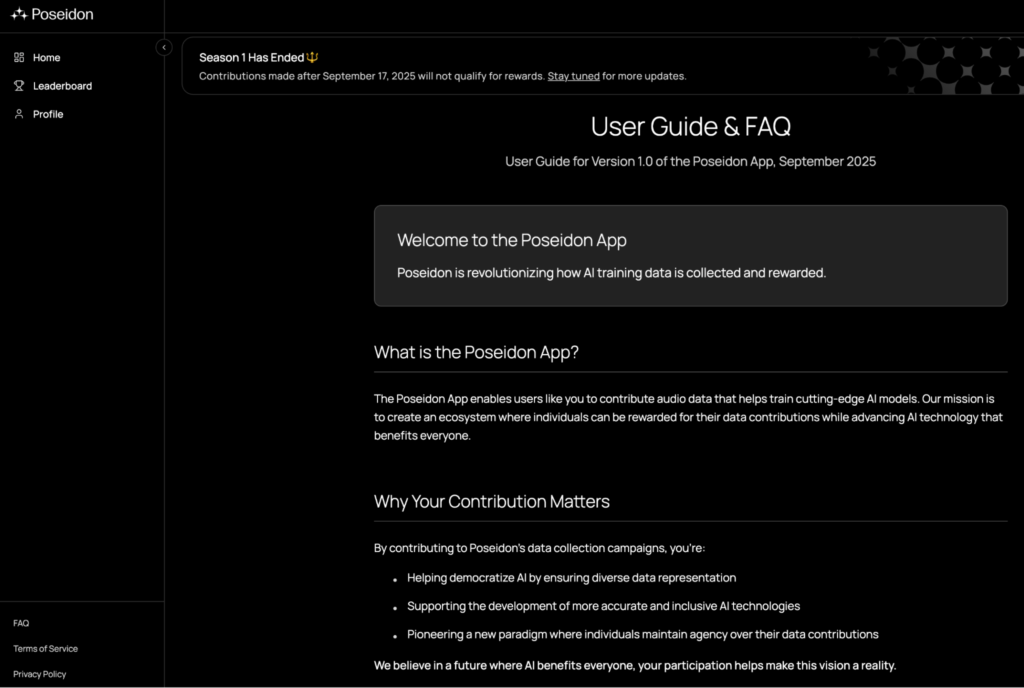As artificial intelligence becomes an increasingly integral part of our lives, the spotlight is often put on model architectures, compute horsepower, or the sheer volume of internet-scraped data. Yet, a subtler but critical inflection point in the availability and provenance of high-quality, rights-cleared, long-tail training data is coming along these days. It is within this realm that Poseidon seeks to establish itself as a foundational platform.
Incubated by the Story Foundation and backed by $15M from a16z crypto, Poseidon is gaining traction not just for what it builds, but for how it builds it.
Why Data Has Become the Bottleneck
In a nutshell, Poseidon is a decentralized data infrastructure platform seeking to address one of AI’s biggest bottlenecks: access to high-quality, rights-cleared, domain-specific training data.
Instead of relying on scraped web content, Poseidon allows individuals, communities, and networks to contribute specialized datasets — from robotics footage to audio samples and sensor data. All datasets are registered on-chain with verified provenance, licensing, and royalty mechanisms, powered by Story Foundation’s programmable IP infrastructure.
In practice, Poseidon acts as a full-stack “data operating system” where contributors are fairly rewarded, and AI developers gain trustworthy, compliant datasets for real-world applications.
As outlined in Poseidon’s Litepaper, the AI industry’s value quarters can be roughly categorised into compute, model architecture, and data. Computing has become commoditised (though expensive), models diffuse quickly across research and open-source, yet data remains the stubborn bottleneck. The challenge lies in the increasingly scarce spectrum of specialized, rights-cleared, non-internet-scraped, long-tail datasets, all of which are costly, difficult to license, and often untraceable in terms of provenance.
This matters because, as Story articulates, the next frontier of impactful AI moves off-screen. Robots manipulating objects, autonomous vehicles navigating complex terrain, voice systems interacting in rare dialects—all of these applications demand unique, high-fidelity data beyond generic web content.
Poseidon’s Approach
Poseidon offers a multi-layered, decentralized solution to the data bottleneck. Its architecture stacks up as follows.
- Data pipelines: Collection, processing, and annotation workflows that enable contributors (from individuals to DePIN networks) to participate in dataset creation.
- Subnetworks (shards): Each tailored to a particular AI domain (e.g., robotics video, audio transcription, multimodal pre-training) to optimize performance, validation and economic alignment.
- IP provenance and licensing: Via Story’s blockchain infrastructure, every dataset and derivative asset is registered on-chain, tied to a programmable IP licence, with royalties and attribution enforced.
In essence, Poseidon aims to be the “data-operating-system” for physical AI to build an operational bridge between supply and demand, enforcing rights, and enabling monetisation of previously untapped data sources.
Why Incubated by Story?
The Story Foundation brings to the table a powerful infrastructure for treating data and IP as first-class, programmable assets. As the blog declares, “AI does not need bigger models. It needs better data.”
Story’s Layer-1 network already supports IP registration, royalty flows, attribution graphs, smart contracts for derivative works, all of which are vital if data is going to be trusted, licensable, and traceable at scale.
Story’s decision to incubate Poseidon suggests that the next trillion-dollar frontier in AI is not just models or computation, but the economics of data. And that data must move from silos to fluid marketplaces, from unlicensed to compliant, and from passive to remunerated.
The App
Poseidon has already launched its app experience, inviting participants to contribute human-data tasks and earn rewards. On its website, Poseidon describes the app as enabling the collection of structured datasets with “clear ownership, licensing, and provenance enshrined.”

Importantly for community members and participants, the platform emphasizes the opportunity to turn everyday data (especially from specialized or niche domains) into value. It actively solicits involvement in data collection, annotation and curation.
Poseidon’s news page highlights the core mission in succinct terms: “Data is the biggest bottleneck in the next wave of AI development. Poseidon is the full-stack data layer that bridges supply and demand for specialised and IP-cleared training data.”

Moreover, Points Program Season 2 is on its way within the app ecosystem (as per the latest community and product updates). This upcoming season indicates an enhanced incentives layer for contributors that incorporates structured reward mechanics tied to data quality, uniqueness, and contribution depth.
Why This Matters for the Community
For the broader community of IP-centric, decentralized infrastructure builders, Poseidon offers a lucrative growth vector.
- Enhanced participation opportunities: Contributors now have a path to monetize long-tail, rights-cleared data, rather than seeing it go idle.
- Stronger infrastructure alignment: For Story Foundation, Poseidon meaningfully extends the IP stack into data-economy territory, deepening the ecosystem.
- New partner/interchange potential: AI model developers, robotics firms, or sensor networks can plug into a marketplace of verified datasets, shortening the route from real-world data to deployed agents.
- Community recognition and value capture: By participating at this stage, especially as Season 2 of the Points Program comes online, early contributors can position themselves for recognition and reward in a system poised for growth and expansion.
Future Prospects
As Poseidon scales, a few points are worth watching.
- On-chain data registrations and marketplace listings: The number and diversity of datasets registered will be a useful proxy for traction.
- Subnetwork growth: How many domain-specific shards (e.g., voice, robotics, autonomous) launch and attract participants.
- Quality vs. quantity trade-off: How the ecosystem balances volume of contributions with high-fidelity, rights-cleared quality.
- Reward mechanics in Points Program Season 2: The structure, transparency, and fairness of the enhanced incentives.
- Adoption by AI developers: Are real models being trained with datasets sourced through Poseidon? That will mark the transition from “infrastructure promise” to “deployed value”.
Conclusion
In many ways, Poseidon feels like a natural next chapter in the evolution of decentralized IP and data infrastructure. By focusing on the often-overlooked area of real-world, rights-cleared, long-tail data, the project is carving out a meaningful niche at the intersection of AI, decentralization, and economic fairness.
For the Story Foundation and its community, this is a meaningful signal that the IP-data economy is entering a new phase. For contributors, it’s an opportunity to participate early in an ecosystem where data is not just scraped or donated, but credited, traced, and rewarded.
Stake with Everstake | Follow us on X | Connect with us on Discord
***
Everstake, Inc. or any of its affiliates is a software platform that provides infrastructure tools and resources for users but does not offer investment advice or investment opportunities, manage funds, facilitate collective investment schemes, provide financial services or take custody of, or otherwise hold or manage, customer assets. Everstake, Inc. or any of its affiliates does not conduct any independent diligence on or substantive review of any blockchain asset, digital currency, cryptocurrency or associated funds. Everstake, Inc. or any of its affiliates’s provision of technology services allowing a user to stake digital assets is not an endorsement or a recommendation of any digital assets by it. Users are fully and solely responsible for evaluating whether to stake digital assets.
